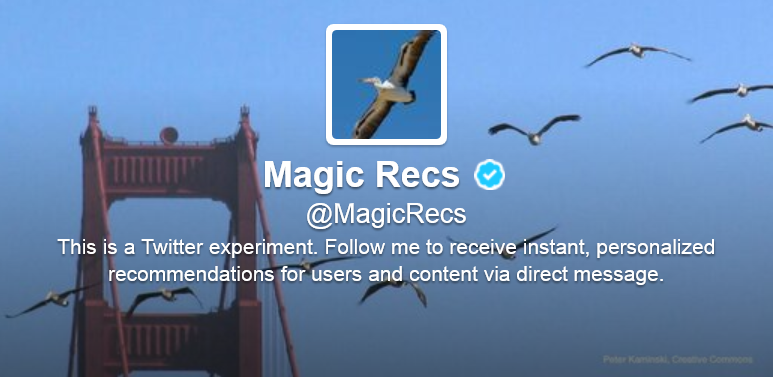Twitter Experiments With a Private Feed
Twitter’s main feature is that everyone’s updates mingle in one vast, public stream, even if each person has a filtered view of it. But two experiments being run by the company suggest it is dabbling with the idea of offering people private and personalized feeds alongside the public one.

The experiments may provide a preview of how Twitter will further expand a service that started out simple but is now becoming more complex (see “Facebook and Twitter Are Converging”).
Opting in to the experiments involves following two special Twitter accounts, which then send personalized messages using the service’s direct message function.
The first of these experiments, @magicrecs, was launched in June. Its followers receive direct messages containing recommendations for other Twitter accounts and tweets that may be of interest. The account’s profile says that it will also recommend “content,” although I’ve not seen any reports of that happening yet.
A second experimental account with a similar design appeared earlier this month. Called @eventparrot, it sends its followers personalized updates on breaking news via direct messages.
Making these services regular accounts that people follow to opt in to is a clever way to introduce this new kind of function without changing Twitter’s overall design much. Twitter could build many more of these services—they’d inevitably be referred to as “apps”—and even make money by using them to push targeted ads.
Perhaps we’ll see @eventparrot joined by @weathertoucan (local weather forecasts), @musicloon (song suggestions based on the accounts you follow), and @dealshawk (personalized offers near your current location).
Keep Reading
Most Popular
Large language models can do jaw-dropping things. But nobody knows exactly why.
And that's a problem. Figuring it out is one of the biggest scientific puzzles of our time and a crucial step towards controlling more powerful future models.
The problem with plug-in hybrids? Their drivers.
Plug-in hybrids are often sold as a transition to EVs, but new data from Europe shows we’re still underestimating the emissions they produce.
How scientists traced a mysterious covid case back to six toilets
When wastewater surveillance turns into a hunt for a single infected individual, the ethics get tricky.
Google DeepMind’s new generative model makes Super Mario–like games from scratch
Genie learns how to control games by watching hours and hours of video. It could help train next-gen robots too.
Stay connected
Get the latest updates from
MIT Technology Review
Discover special offers, top stories, upcoming events, and more.